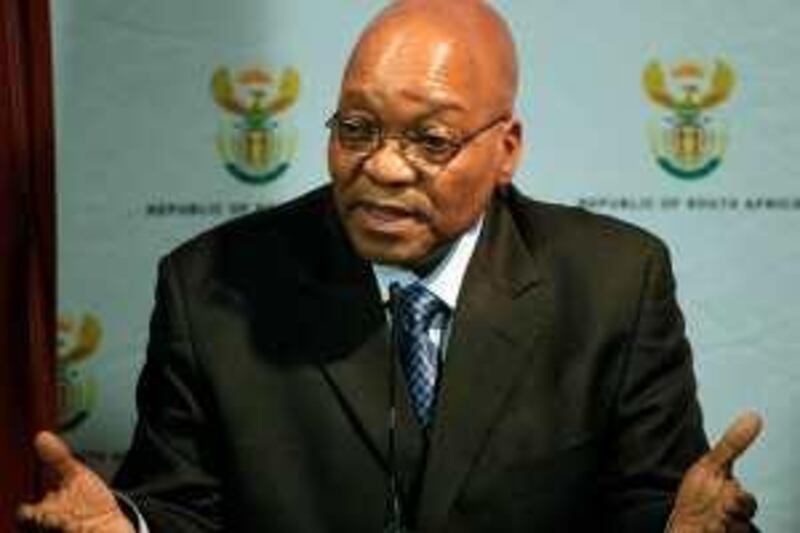JOHANNESBURG // It seemed like such a generous gesture - altogether too generous, in fact. A group of contractors, grateful for the business he had put their way, threw a farewell party earlier this month for Sbu Ndebele, the outgoing premier of KwaZulu-Natal province. At the event they presented him with a range of gifts, including two cows and a Mercedes worth US$140,000 (Dh514,000). The contractors had reason to hope that Mr Ndebele might be able to make further efforts on their behalf - he has just been promoted to transport minister in Jacob Zuma's incoming administration and his new department has tens of millions of dollars a year to spend on improving the country's infrastructure. But corruption is a continuing concern in South Africa, where Mr Zuma has pledged himself to finally deliver on the promise of "a better life for all", while ANC figures are regularly alleged to have benefited more than most from the fruits of democracy. Even in his inauguration speech Mr Zuma declared: "To achieve all our goals we must hold ourselves to the highest standards of service, probity and integrity." The car was simply too much, an impression hardly countered by a representative of the contractors who declared: "We had to buy him an expensive car because he is a senior man." As outrage mounted, with both the opposition Democratic Alliance and the trade union federation Cosatu, an ANC ally, calling for the car to be returned, it was an opportunity for Mr Zuma to set the stamp on his government, to mark a departure from the perceptions of the past. He declined to do so. Under South Africa's code of ministerial practice, if a public representative receives a gift worth more than R1,000 (Dh460) he must inform the president in writing. The president decides whether the item can be kept, must be returned or handed over to the state. In keeping with the law, Mr Ndebele did so - but Mr Zuma ruled that it was up to his minister whether to keep the car and that he would not intervene. Given the choice, Mr Ndebele won himself an approving set of headlines when he declared he would be returning the vehicle - although he still insisted that there was nothing wrong with the gift, that rejecting it amounted to an insult to the givers and he was only doing so to avoid "hassle". It does not point to a change of heart on Mr Ndebele's part, or indeed, to a change of mindset by the ruling party, despite Mr Zuma's promises. Under an editorial headed "Gifts for officials aren't right, even if Zuma won't say so," The Times newspaper said returning the car was a "no-brainer". "It is simply unacceptable for any recipient of government business to provide any payment or reward to a government official. At the very least it is dangerously naive. At worst it is a calculated move aimed at repaying an official for his role in awarding the contract. "What is truly shocking is the attitude of the new president, Jacob Zuma. Ndebele declared the gift to him and Zuma's answer was that there was nothing wrong in accepting it. This is very bad advice and it suggests that there was nothing wrong in accepting it." In the same newspaper, a columnist, Aspasia Karras, wrote that the minister "just doesn't get it". "All definitions of corruption boil down to this handy one-liner from Transparency International: 'Corruption is the misuse of public power for private gain'," she wrote. "Whatever you say, a million-plus car equals private gain." It is a problem that Mr Zuma will face again and again during his coming five years in office. The ANC has been voted back into power on a promise to improve the lot of ordinary South Africans, the poor and the marginalised, but at the same time it operates vast patronage networks of its own and Mr Zuma must try to keep the disparate wings of his coalition together. Anthony Butler, a professor of public policy at the University of Cape Town, pointed out that over the decades of struggle, the intellectuals of the South African Communist Party (SACP) - which has often functioned as almost an in-house think tank for the ANC, rather than an engine of Marxist social revolution - have "worried, above all, that the ANC would throw off colonial rule only to become a parasitic elite itself, no less dependent than the former oppressors on the looting of state resources". It is an analysis that explains why the SACP and Cosatu are among the most vocal bodies in calling for accountability and probity in government. But Mr Zuma had made a "deliberate non-decision" about the car, Prof Butler said. "This means that the SACP's project of curtailing the abuse of elite power may already be dead in the water." sberger@thenational.ae
Car gift dents ANC anti-corruption drive
South African president does nothing to quell concerns about corruption in his party by refusing to demand his cabinet minister return a Mercedes.

Editor's picks
More from the national




